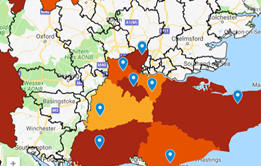HSJ’s map shows the 86 clinical commissioning groups proposing mergers in 2020, in what looks set to be the largest NHS consolidation for more than a decade.
Shaded CCGs have merger proposals agreed or in development. A group is shaded in the same colour as the nearby ones which it may merge with.
Click on the blue marker to see the details of the proposed merger.
If you have any updates to the map, email HSJ news manager Hayley Kirton.
Sweeping mergers of clinical commissioning groups proposed for the months ahead would leave a patchwork of different arrangements across the country.
About three-quarters of around 125 CCGs potentially in place next April will operate on boundaries unchanged since they were created in 2013 under the Lansley reforms.
The remaining commissioners will typically work over larger areas, with the giant North West London CCG holding a budget of £3.4bn.
Most of the newly-merged CCGs will work within existing sustainability and transformation partnership/integrated care system footprints.
But several established STP/ICS boundaries face being redrawn following CCG mergers, leading to fresh upheaval in relationships with other commissioners, providers and local authorities.
In Sussex, three CCGs covering East Sussex, West Sussex, and Brighton and Hove are likely to emerge from seven currently in place with a single joint management team.
East Surrey CCG, currently part of the Sussex and East Surrey STP, will move to merge into a single commissioner within Surrey Heartlands ICS.
In North Yorkshire, three CCGs – Harrogate, Scarborough and Ryedale, and Hambleton, Richmondshire and Whitby – have agreed to merge after a review last year found they were individually unable to provide the strategic direction required.
The switch will leave the new commissioner straddling three separate STP/ICS areas. NHS England and the systems are yet to indicate if that will continue or if new STP/ICS boundaries will be created.
Meanwhile, HSJ analysis suggests that, in many cases, efficiency savings from mergers will not deliver a nationally-mandated 20 per cent reduction in running costs and further cuts will be required. They are required to achieve a 20 per cent reduction on 2017-18 running costs by April, but the scale of expected savings from mergers is variable.
In Herefordshire and Worcestershire, officials calculate they will save nearly £2m from a four-way CCG merger – equivalent to their target cost reduction.
But others say more savings will be needed, with three CCGs in Bradford and Craven in North Yorkshire estimating they will save only £1m of the £2.5m required by merging.
Across the country, the scope for redundancies or redeployment of senior executives is limited, as many areas already have joint leadership teams in place. Local leaders are reviewing vacant roles and looking at rationalising office space, with redundancies expected to follow as the shape of new structures is confirmed.
Among the CCGs to disappear will be Corby – the smallest in the country serving only 80,000 people and five GP practices – which is expected to link with Nene CCG to create a single commissioner in Northamptonshire.
The largest commissioner to emerge will follow the merger of eight CCGs in North West London, covering 2.2 million people.
Outside the capital, the potential amalgamation of eight CCGs in Kent and Medway would serve 1.8 million people.
Further consolidation will take place in line with official guidance. This states that, by April 2021, all of England will be covered by ICSs involving a CCG or CCGs working together to take a single set of commissioning decisions at system level.
No formal public consultation is required for merger plans although CCGs are carrying out engagement exercises.
NHSE is expected to issue its final verdicts on proposed mergers in the autumn.
Map by Hayley Kirton
The HSJ Integrated Care Summit, taking place at the Hilton Deansgate, Manchester from 19-20 September, unites 150+ senior leaders from across the provider, commissioning and local council landscape to determine how to best capitalise on the new funding settlement to rethink service delivery to improve quality and outcomes for your local population.
Held under the Chatham House Rule, attendees will quiz Simon Stevens, Rosie Benneyworth and other national figures on general policy direction, and co-develop solutions to their local challenges with NHS and local government colleagues from across the country. The Summit is free to attend for senior NHS and public sector figures – register your interest here: https://integratedcare.hsj.co.uk/register-2019
Source
CCGs
Source Date
July 2019
Topics
- Commissioning
- Finance
- Integrated care
- London
- NHS Airedale, Wharfedale and Craven CCG
- NHS Bradford City CCG
- NHS Bradford Districts CCG
- NHS Corby CCG
- NHS East Surrey CCG
- NHS England (Commissioning Board)
- NHS Hambleton, Richmondshire and Whitby CCG
- NHS Harrogate and Rural District CCG
- NHS Herefordshire CCG
- NHS Scarborough and Ryedale CCG
- NHS South Kent Coast CCG
- NHS South Worcestershire CCG
- NHS West Kent CCG
- Service redesign
Mapped: Sweeping CCG mergers planned for next year

HSJ’s map shows the 86 clinical commissioning groups proposing mergers in 2020, in what looks set to be the largest NHS consolidation for more than a decade.
 Currently
reading
Currently
reading
Mapped: Sweeping CCG mergers planned for next year
- 2






























7 Readers' comments